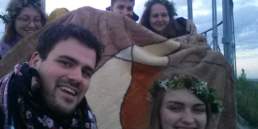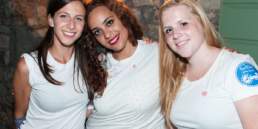One of the Focus Area closely related to AEGEE’s existence is European Citizenship, with the aim to empower young people to become active Europeans. Contributing to that is the European Citizenship Working Group (ECWG), which supports the Network in organising activities and sets up its own related activities too. Lila Quaile, member of AEGEE-Paris, is motivated to take on the leadership of the ECWG for the next term, starting on the 1st of August. About time that we get to know her better!
Svenja van der Tol: For those who do not know you yet – can you shortly introduce yourself?
Lila Quaile: Sure. So hi everyone, I’m Lila – current president of AEGEE Paris. I’m in AEGEE since some months ago, I joined after my Erasmus in Torino where I had the chance to get to know AEGEE. I’m now living in Paris for my studies but I was born in the South of France, I have a Mediterranean soul. I’m in my first year of my Master’s in Political Sciences specialised in European and International Affairs. I’m doing now an internship until July at the European House Association of Yvelines, which aims to promote an active European Citizenship by organising exchanges, training, conferences, workshops for children and so on. I’m totally in love with AEGEE since the beginning and I can not wait to be even more active! One last thing: I’m a ginger and not a redhead, it is important to say it! (Lila laughs)
Why did you choose the Focus Area of European Citizenship in particular, instead of the other three options?
I joined AEGEE at the end of my Erasmus, and this experience has made me feel more European than ever. Even before becoming an official member, I knew I wanted to be an active one, I knew I wanted to do something for AEGEE and for Europe. Due to my studies of Political Sciences I was feeling closer to this topic than the other ones. My experience in AEGEE and my Erasmus allowed me to experience what it really means to be a citizen of Europe. And that’s why I applied for this position, because I want to encourage people to become active European citizens and to understand that being a citizen of Europe means being part of a community.
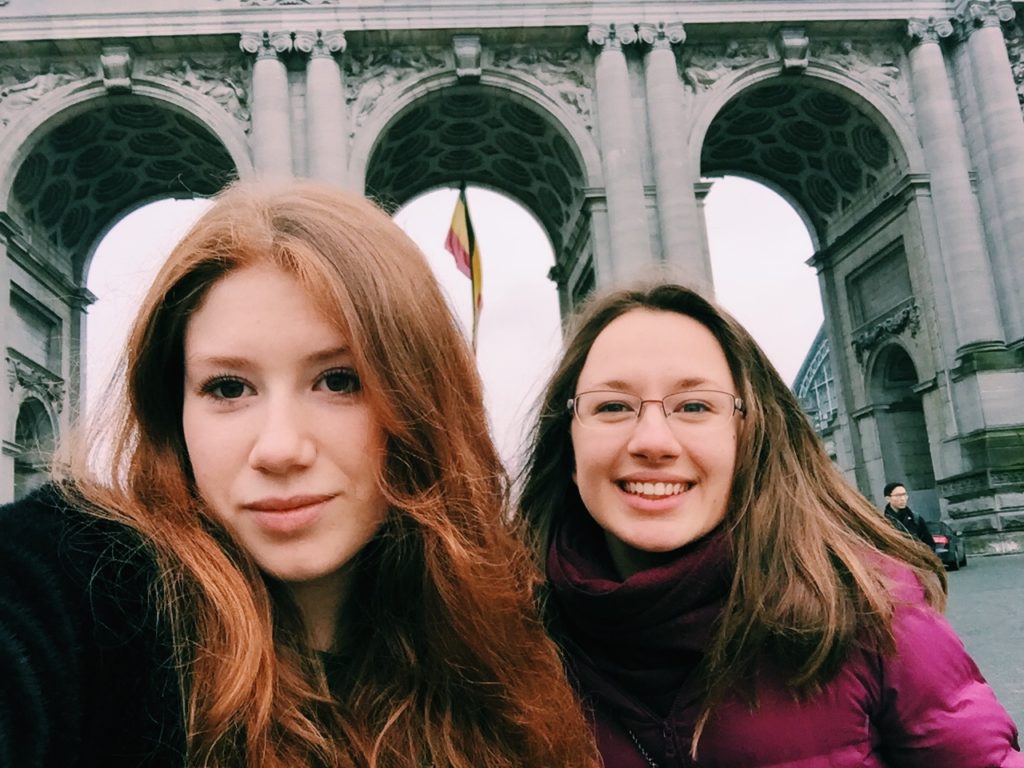
How have you been informing yourself of the work of the current Working Group? Are you a jobshadower, for example?
Indeed I’m a jobshadower, really recent one but I am! So far, I had the chance to attend one Skype call and to see on which events, activities and so on they were working on. I will try to attend calls as much as possible from now on. Moreover, I’m in contact with the current coordinator, Álvaro, and we had the chance to meet when I was in Brussels during Easter with AEGEE-Paris. We talked about our visions of the ECWG and it was really interesting to speak with him.
Which practices that the European Citizenship Working Group is currently implementing would you like to continue in your term?
What I really like about their practices is how there are strengthening collaboration with locals through lots of events. They are really supporting locals tackling this issue of European Citizenship, and I really think it is the key to fulfil the aims drafted into the Action Agenda: lean on the locals. I will continue this for sure, by having a close relation with the locals! The European Citizenship Working Group also organised conferences this year, such as the one in Warsaw and I heard only good things about it. I will continue to organise such activities because they are really important for AEGEE, they are showing another part of AEGEE. And they can attract new members interested in European issues.
Why would you prefer to be a coordinator instead of a Working Group member?
Of course, it’s because I like to be in charge! (Lila laughs) Joke aside, I joined AEGEE to be active. I started by being directly the president of AEGEE-Paris. I don’t know what is it to be a non-active-member. 2018-2019 will be my last year of university, I will graduate my Master’s in September 2019, so I don’t know how much time I will have after that to be active in AEGEE. For me it just seems to be the right time for doing that. I saw the open call for this position and suddenly I couldn’t think about anything else. I needed to apply for it. It can sound weird because I have never worked in any European body, but it seems that I don’t like to climb the ladder step by step, I prefer to jump directly to the last one.
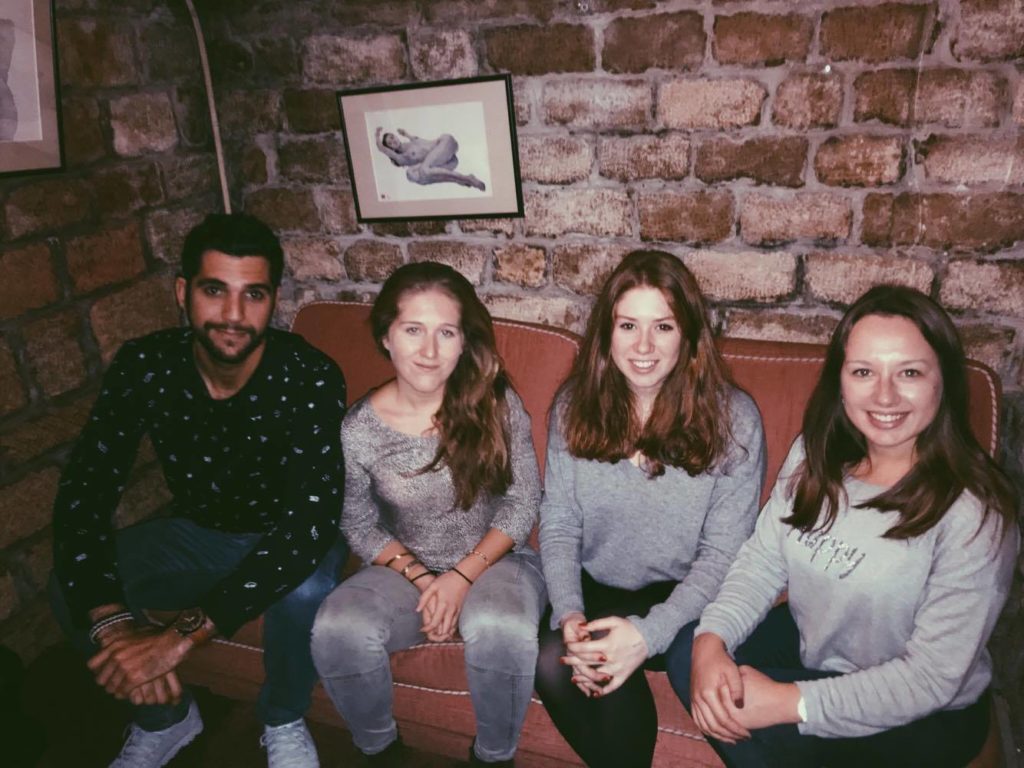
Which experiences make you qualified?
I think that my experience as AEGEE-Paris President is significant for this position. Indeed, I had to start everything from scratch: find new members, deal with all administrative procedures, promote AEGEE in a city where no one knows it. I basically met the people of my board during the elections, and I do believe than in a short period of time we succeeded in reviving AEGEE-Paris. This experience taught me how to manage a team, how to coordinate it, but especially how to empower people and support them in their activeness. I would also like to point out my involvement in the Politics Interest Group. I am now the main responsible for the Europe Café branded activity pilot on behalf of POLIG, managing the dedicated POLIG team in this initiative. I think it can be an asset for the role of ECWG coordinator since the branded activity is part of the Action Agenda and I am aware of what need to be done. The last thing I would like to speak about is my internship at the European House Association of Yvelines. It is not linked to AEGEE, but it is linked to the topic of European Citizenship. We organised Erasmus+ exchanges about ruralities and how to make rural areas attractive to Europeans by sharing good practices from citizens; we are doing trainings for young people participating in the Erasmus+ project for professionalisation; we are creating workshops about Europe and citizenship for children and high-schoolers; and I assisted the jury of the Jean Monnet Contest about the topic “Europe in thirty years”. The knowledge I’m acquiring during this internship will be really useful for my work in European Citizenship.
Which three things would you like to achieve with the Working Group during your term?
First: improve and increase the collaboration with other bodies tackling the issue of European Citizenship. Second: encourage locals to organise activities related to European Citizenship for non-AEGEEans, such as children and high-schoolers, as they are the future of Europe and I think that problems cannot be tackled if we are focusing only on AEGEEans. Third: obviously, fulfilling the Action Agenda objectives. They are drafted by the members of AEGEE and as a Working Group it is our duty to respect them and fulfill them.
What is your opinion on the drafted Action Agenda objectives for the European Citizenship Focus Area? Which one are you most excited about, and why?
I was not at the European Planning Meeting in Yerevan so I discovered the drafted objectives when the Comité Directeur published them. They have been drafted by AEGEE members so we should respect them. The one I am the most excited about, is about branded activity. I am already working on it with the Europe Café initiative and I will continue to work actively on that because it is a great opportunity for AEGEE. The objective about study trips is also really interesting for me. I organised one to Brussels with AEGEE-Paris and it was wonderful, as European Citizenship Working Group coordinator I will encourage and support all the locals willing to do the same.
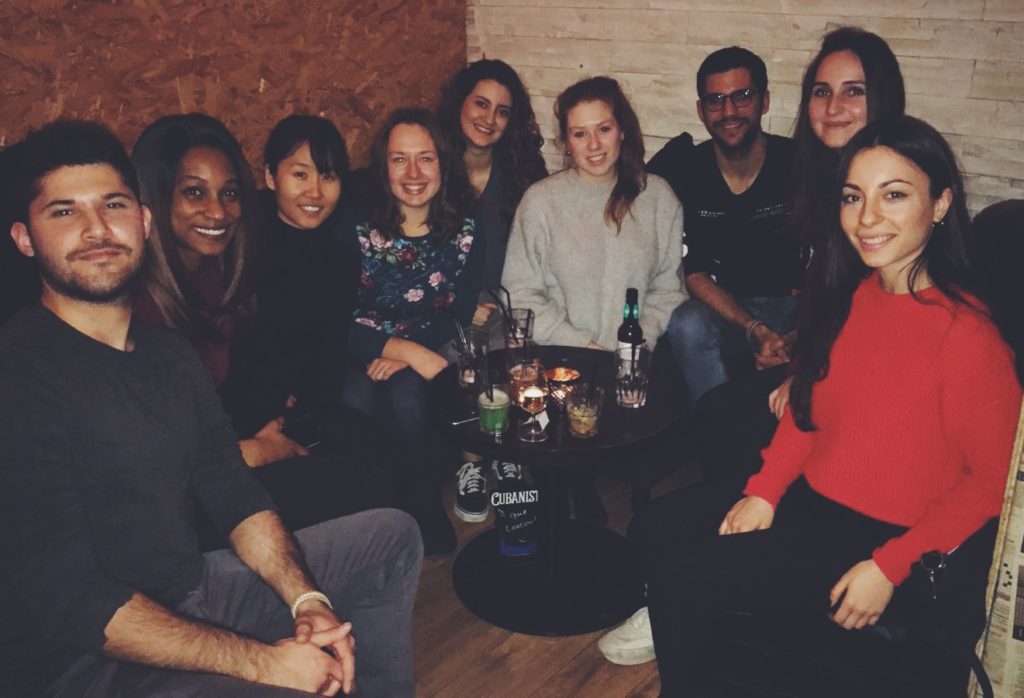
How do you see the role of the Working Group externally, for example looking at the position of the Policy Officer?
A Working Group should be a window of what AEGEE is doing, of the impact of AEGEE on the society, on what AEGEE is working on. A Working Group is not only for AEGEEans but also for external people, no matter if they are decision-makers or simple citizens. It should lean on and collaborate with locals but for an external purpose. The position of a Policy Officer is linked to a Working Group, it is important for AEGEE to have one. The Policy Officer should draft a policy paper, but in accordance with what the working group is striving for and think about each topic.
What are your plans for the European Elections taking place in 2019? Will you search for cooperation with other bodies?
Of course I will collaborate with other bodies. AEGEE has this great opportunity to be a network, a network of people and bodies sharing the same values and having wonderful ideas. First there is YVote Project, I do believe that as European Citizenship Working Group it is our duty to support it. Voting is a right but it’s also a duty, unfortunately the European Elections are suffering from abstention. I would like to collaborate with the locals in order to propose workshops and other activities regarding European Elections. There are so many possibilities! Another body I would like to collaborate with is the Politics Interest Group. POLIG is the open-space in AEGEE to talk about politics. Elections are deeply political so I think that a collaboration with POLIG will make a lot of sense.
Do you have experience in and ideas for fundraising?
I cannot say that I have experience, but when we organised AEGEE–Paris’ New Years Event we tried to fundraise and we succeeded a bit. Now, we are implementing a real fundraising campaign for our Summer University. Ideas I don’t really know, but there is a lot of grants for which AEGEEans can apply, and I really think that we should improve our knowledge about it.
Questions by the network
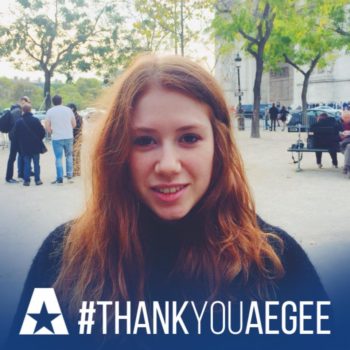 Question by Álvaro Gonzalez, AEGEE-Heidelberg: Will you join the European Citizenship Working Group even if you are not elected as coordinator?
Question by Álvaro Gonzalez, AEGEE-Heidelberg: Will you join the European Citizenship Working Group even if you are not elected as coordinator?
Of course I will join it. Not being elected will not undermine my desire of being part of this Working Group! In any case I will be happy to work on this topic, because more than being a coordinator I really like the topic of European Citizenship and in nowadays world it’s important to spread it into the society.
Question by Erika Bettin, AEGEE-Verona: In every WG there is a Policy Officer in charge of possibly drafting a policy paper. Of course, you will have to discuss the topic with the team, but what are some areas that can be tackle when deciding on the topic?
That’s a difficult question to answer alone! A Working Group is a team so obviously topics should be discussed and approved within a team. What I can say is that I would like to see the Working Group tackle the issues concerning youth abstention, nationalism and euroscepticism because whatever we can say, a lot of people are feeling far from Europe and are only seeing it as threatening the national integrity, and this is playing in favour of populism and anti-Europe parties. I think one topic that can also be tackled is the promotion of Europe integration, which has been a bit forgotten in my opinion.
Find Lila’s complete candidature here.
By Svenja van der Tol, AEGEE-Nijmegen

